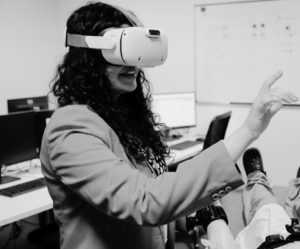Work
My work spans healthcare, public sector innovation and independent research, with a focus on helping emerging technologies move from promise to practical use.
From evaluating immersive tools for children in pain, to shaping AI governance and literacy in hospitals, to supporting startups and public health teams, each project is grounded in real-world context, co-creation and measurable impact.

Operationalising AI Governance in Healthcare
AI · Governance · Organisational Readiness
Project
Trust-wide AI policy, governance framework and implementation toolkit
Summary
Led the development of a practical AI governance framework to support safe, responsible and usable adoption of AI within a healthcare organisation.
Impact
Translated emerging regulation and ethical principles into clear organisational processes.
- Aligned with emerging UK and EU AI governance expectations
Enabled clinicians, digital teams and leaders to assess, approve and manage AI tools consistently
Supported innovation while reducing uncertainty around risk, accountability and trust
Digital Literacy and Inclusion Programme
Healthcare · Workforce · Evaluation
Recognition: Shortlisted for national HSJ Award 2025
Summary
Led the evaluation of a trust-wide programme to build digital confidence and inclusion across frontline NHS staff, particularly those traditionally excluded from digital transformation efforts.
Impact
Reached 500+ clinical and non-clinical staff
Improved confidence, engagement and team cohesion
Informing wider NHS approaches to inclusive digital upskilling
Developing a Local Training Programme for XR in Healthcare
Healthcare · XR · Evaluation
Publication: JMIR- XR and Spatial Computing
🔗 Read it here
Summary
Co-developed and evaluated a local training programme to support healthcare professionals in engaging with immersive technologies such as VR and AR.
Impact
Improved staff awareness, confidence and readiness to experiment with XR
Addressed both technical and emotional barriers to adoption
Presented at conferences and adapted for wider rollout across NHS innovation hubs
Extended Reality for Breast Care Remote Consulting
Healthcare · XR · Communication
Publication: RCS Bulletin
🔗 Read it here
Summary
Collaborated with a clinical breast care team to explore how extended reality could support more human, empathetic communication in remote consultations.
Impact
Addressed emotional disconnect and miscommunication in virtual breast care consultations
Contributed to policy and professional discussion on XR in remote care
Demonstrated potential for XR-supported training in empathetic communication
Leadership Capabilities of Underrepresented Healthcare Leaders
Healthcare · Leadership · Research
Publication: 🔗 Read it here
Summary
Co-led a mixed-methods research project examining the leadership capabilities, trajectories and systemic barriers experienced by underrepresented leaders within NHS organisations.
Impact
Reframed leadership capability to include emotional intelligence, cultural navigation and systems thinking
Informed local leadership development and talent recognition initiatives
Continues to support more inclusive approaches to leadership progression within NHS Trusts
Technology-Enhanced Learning for COVID-19 Response
Healthcare · Digital Education · Evaluation
Publication: Book Chapter in Healthcare Innovation: Shaping Futures
🔗 Read it here
Summary
Led the documentation and evaluation of rapid, technology-enhanced learning interventions deployed across NHS services during the COVID-19 crisis.
Impact
Supported frontline staff with timely training on evolving protocols and remote care
Improved knowledge retention, confidence and workforce morale during a health emergency
Informed longer-term NHS approaches to digital education and learning resilience
VR for Women’s Health: Use Cases and Evaluation
Healthcare · XR · Women’s Health
Publication: White Paper on Gender-Specific Innovation in VR
🔗 Read it here
Summary
Authored a strategic review of immersive technologies in women’s health, examining use cases, gaps and evaluation challenges in predominantly gender-neutral VR design.
Impact
Identified under-represented women’s health applications including pelvic pain, birth trauma and body image
Proposed practical strategies for inclusive design, co-creation and evaluation
Informing funding priorities and product development across NHS and academic innovation networks
